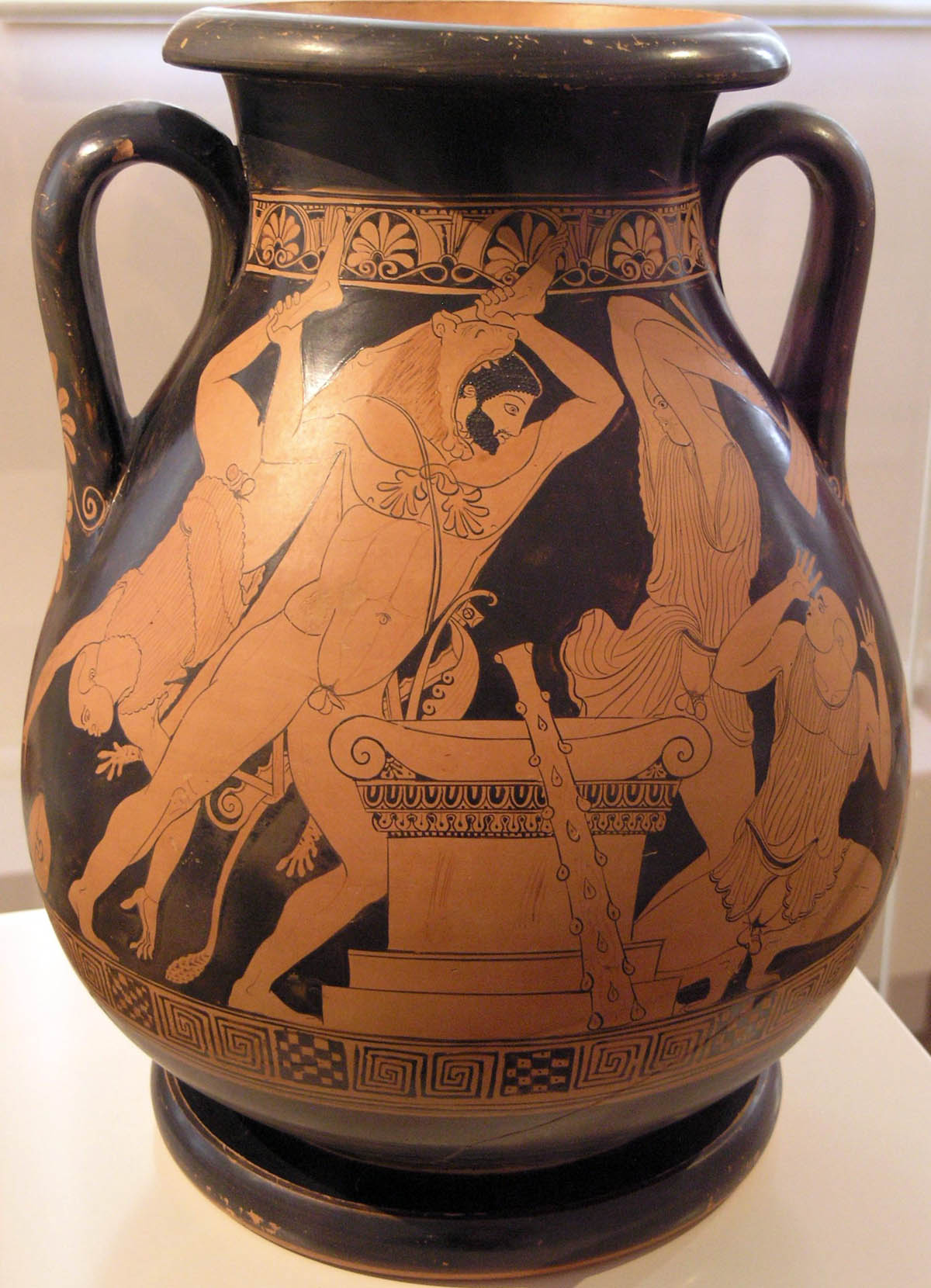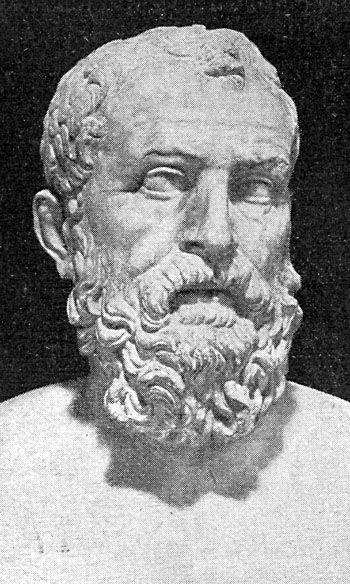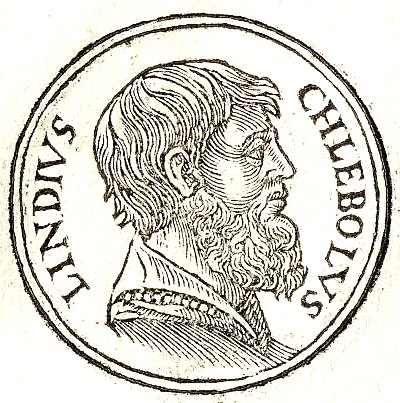|
Myson
Myson of Chenae (; grc-gre, Μύσων ὁ Χηνεύς; fl. 6th-century BC), also called "of Chen", was, according to Plato, one of the Seven Sages of Greece. He is not to be confused with the Myson of 5th-century Athens who ran a pottery and inspired, and taught, many of the Mannerists including the Pan Painter. Biography According to Sosicrates, who quoted Hermippus, Myson was the son of Strymon, a tyrant of his country. Diogenes Laërtius. ''Lives of the Eminent Philosophers''. Translated by Robert Drew Hicks. Cambridge: Harvard University Press. Volume 1. 1982. Page 113 All sources agree that Myson was a plain farmer, though they differ as to his place of birth and residence. He is said to have lived in the village of Chen, though this is variously located in Laconia or Crete. He is also said to be "of Oeta", which seems to be a reference to Mount Oeta; but the reference is sometimes read as "Etea" instead, which again may have been in Laconia or else in Crete.Diogenes La ... [...More Info...] [...Related Items...] OR: [Wikipedia] [Google] [Baidu] |
Seven Sages Of Greece
The Seven Sages (of Greece) or Seven Wise Men (Greek: ''hoi hepta sophoi'') was the title given by classical Greek tradition to seven philosophers, statesmen, and law-givers of the 7–6th century BC who were renowned for their wisdom. The Seven Sages Typically the list of the seven sages includes: * Thales of Miletus () is the first well-known Greek philosopher, mathematician, and astronomer. His advice, "Know thyself", was engraved on the front facade of the Temple of Apollo in Delphi. * Pittacus of Mytilene () governed Mytilene (Lesbos). He tried to reduce the power of the nobility and was able to govern with the support of the demos, whom he favoured. * Bias of Priene () was a politician and legislator of the 6th century BC. * Solon of Athens () was a famous legislator and reformer from Athens, framing the laws that shaped the Athenian democracy. * The fifth and sixth sage are variously given as two of: Cleobulus, tyrant of Lindos (), reported as either the g ... [...More Info...] [...Related Items...] OR: [Wikipedia] [Google] [Baidu] |
Diogenes Laërtius
Diogenes Laërtius ( ; grc-gre, Διογένης Λαέρτιος, ; ) was a biographer of the Greek philosophers. Nothing is definitively known about his life, but his surviving ''Lives and Opinions of Eminent Philosophers'' is a principal source for the history of ancient Greek philosophy. His reputation is controversial among scholars because he often repeats information from his sources without critically evaluating it. He also frequently focuses on trivial or insignificant details of his subjects' lives while ignoring important details of their philosophical teachings and he sometimes fails to distinguish between earlier and later teachings of specific philosophical schools. However, unlike many other ancient secondary sources, Diogenes Laërtius generally reports philosophical teachings without attempting to reinterpret or expand on them, which means his accounts are often closer to the primary sources. Due to the loss of so many of the primary sources on which Diogenes rel ... [...More Info...] [...Related Items...] OR: [Wikipedia] [Google] [Baidu] |
Pan Painter
The Pan Painter was an ancient Greek vase-painter of the Attic red-figure style, probably active c. 480 to 450 BC. John Beazley attributed over 150 vases to his hand in 1912: Archaic Mannerism Beazley identified the Pan Painter as a pupil of Myson, teacher of the Mannerists (beginning around the 470s BC), a term applied (often pejoratively) to a group who used "mannered" depiction of figures for decorative effect. Mannerists also magnified the gestures, made most forms skinnier and at the same time shrunk the heads of the figures. More attention was given to the pattern that clothing offered than the naturalization of the human form. Most often, either black buds or black ivy create frames around the scenes. Most of the pottery that has been attributed to Mannerists are pelikai, hydriai, and kraters. Though the original names of the artists are unknown, historians have given artists names based on pieces that seem to be painted by the same person or group of artists; so ... [...More Info...] [...Related Items...] OR: [Wikipedia] [Google] [Baidu] |
Plato
Plato ( ; grc-gre, Πλάτων ; 428/427 or 424/423 – 348/347 BC) was a Greek philosopher born in Athens during the Classical period in Ancient Greece. He founded the Platonist school of thought and the Academy, the first institution of higher learning on the European continent. Along with his teacher, Socrates, and his student, Aristotle, Plato is a central figure in the history of Ancient Greek philosophy and the Western and Middle Eastern philosophies descended from it. He has also shaped religion and spirituality. The so-called neoplatonism of his interpreter Plotinus greatly influenced both Christianity (through Church Fathers such as Augustine) and Islamic philosophy (through e.g. Al-Farabi). In modern times, Friedrich Nietzsche diagnosed Western culture as growing in the shadow of Plato (famously calling Christianity "Platonism for the masses"), while Alfred North Whitehead famously said: "the safest general characterization of the European philosophical tradit ... [...More Info...] [...Related Items...] OR: [Wikipedia] [Google] [Baidu] |
Stephen Of Byzantium
Stephanus or Stephan of Byzantium ( la, Stephanus Byzantinus; grc-gre, Στέφανος Βυζάντιος, ''Stéphanos Byzántios''; centuryAD), was a Byzantine grammarian and the author of an important geographical dictionary entitled ''Ethnica'' (). Only meagre fragments of the dictionary survive, but the epitome is extant, compiled by one Hermolaus, not otherwise identified. Life Nothing is known about the life of Stephanus, except that he was a Greek grammarian who was active in Constantinople, and lived after the time of Arcadius and Honorius, and before that of Justinian II. Later writers provide no information about him, but they do note that the work was later reduced to an epitome by a certain Hermolaus, who dedicated his epitome to Justinian; whether the first or second emperor of that name is meant is disputed, but it seems probable that Stephanus flourished in Byzantium in the earlier part of the sixth century AD, under Justinian I. The ''Ethnica'' Even as ... [...More Info...] [...Related Items...] OR: [Wikipedia] [Google] [Baidu] |
Anacharsis
Anacharsis (; grc, Ἀνάχαρσις) was a Scythian philosopher; he travelled from his homeland on the northern shores of the Black Sea, to Ancient Athens, in the early 6th century BC, and made a great impression as a forthright and outspoken barbarian, that is, a non-Greek speaker. He very well could have been a forerunner of the Cynics, in part because of his strong, but playful, '' parrhesia''. None of his works have survived. Life Anacharsis the son of Gnurus, a Scythian chief, was half Greek and from a mixed Hellenic culture, apparently in the region of the Cimmerian Bosporus. He left his native country to travel in pursuit of knowledge, and came to Athens about 589 BC, at a time when Solon was occupied with his legislative measures. According to the story recounted by Hermippus, Anacharsis arrived at the house of Solon and said, "I have traveled here from afar to make you my friend." Solon replied, "It's better to make friends at home." Thereupon the Scythian repl ... [...More Info...] [...Related Items...] OR: [Wikipedia] [Google] [Baidu] |
Oracle Of Delphi
Pythia (; grc, Πυθία ) was the name of the high priestess of the Temple of Apollo at Delphi. She specifically served as its oracle and was known as the Oracle of Delphi. Her title was also historically glossed in English as the Pythoness. The name ''Pythia'' is derived from ''Pytho'', which in myth was the original name of Delphi. Etymologically, the Greeks derived this place name from the verb () "to rot", which refers to the sickly sweet smell from the decomposing body of the monstrous Python after it was slain by Apollo. The Pythia was established at the latest in the 8th century BC, (though some estimates date the shrine to as early as 1400 BC), and was widely credited for her prophecies uttered under divine possession (enthusiasmos) by Apollo. The Pythian priestess emerged pre-eminent by the end of the 7th century BC and continued to be consulted until the late 4th century AD. During this period, the Delphic Oracle was the most prestigious and authoritative orac ... [...More Info...] [...Related Items...] OR: [Wikipedia] [Google] [Baidu] |
Cleobulus
Cleobulus (; el, Κλεόβουλος ὁ Λίνδιος, ''Kleoboulos ho Lindios''; fl. 6th century BC) was a Greek poet and a native of Lindos. He is one of the Seven Sages of Greece. Life Cleobulus was the son of Evagoras and a citizen of Lindus in Rhodes. Clement of Alexandria called Cleobulus king of the Lindians, and Plutarch spoke of him as the tyrant. The letter quoted by Diogenes Laërtius, in which Cleobulus invites Solon to Lindus as a democratic place of refuge from the tyrant Peisistratus in Athens, is undoubtedly a later forgery. Cleobulus is also said to have studied philosophy in Egypt.Diogenes Laërtius, i. 89 He had a daughter, Cleobulina, who found fame as a poet, composing riddles in hexameter verse. Cleobulus is said to have lived to the age of seventy, and to have been greatly distinguished for strength and beauty of person. Extant fragments Cleobulus apparently wrote lyric poems, as well as riddles in verse. Diogenes Laërtius also ascribes to him the ins ... [...More Info...] [...Related Items...] OR: [Wikipedia] [Google] [Baidu] |
Eudoxus Of Cnidus
Eudoxus of Cnidus (; grc, Εὔδοξος ὁ Κνίδιος, ''Eúdoxos ho Knídios''; ) was an ancient Greek astronomer, mathematician, scholar, and student of Archytas and Plato. All of his original works are lost, though some fragments are preserved in Hipparchus' commentary on Aratus's poem on astronomy. '' Sphaerics'' by Theodosius of Bithynia may be based on a work by Eudoxus. Life Eudoxus was born and died in Cnidus (also spelled Knidos), which was a city on the southwest coast of Asia Minor. The years of Eudoxus' birth and death are not fully known but the range may have been , or . His name Eudoxus means "honored" or "of good repute" (, from ''eu'' "good" and ''doxa'' "opinion, belief, fame"). It is analogous to the Latin name Benedictus. Eudoxus's father, Aeschines of Cnidus, loved to watch stars at night. Eudoxus first traveled to Tarentum to study with Archytas, from whom he learned mathematics. While in Italy, Eudoxus visited Sicily, where he studied medi ... [...More Info...] [...Related Items...] OR: [Wikipedia] [Google] [Baidu] |
Demetrius Of Phaleron
Demetrius of Phalerum (also Demetrius of Phaleron or Demetrius Phalereus; grc-gre, Δημήτριος ὁ Φαληρεύς; c. 350 – c. 280 BC) was an Athenian orator originally from Phalerum, an ancient port of Athens. A student of Theophrastus, and perhaps of Aristotle, he was one of the first members of the Peripatetic school of philosophy. Demetrius had been a distinguished statesman who was appointed by Cassander, the King of Macedon, to govern Athens, where Demetrius ruled as sole ruler for ten years. During this time, he introduced important reforms of the legal system, while also maintaining pro-Cassander oligarchic rule. Demetrius was exiled by his enemies in 307 BC. He first went to Thebes, and then, after 297 BC, went to the court of Alexandria. He wrote extensively on the subjects of history, rhetoric, and literary criticism. He is not to be confused with his grandson, also called Demetrius of Phaleron, who probably served as regent of Athens between 262 and 255, ... [...More Info...] [...Related Items...] OR: [Wikipedia] [Google] [Baidu] |
Stobaeus
Joannes Stobaeus (; grc-gre, Ἰωάννης ὁ Στοβαῖος; fl. 5th-century AD), from Stobi in Macedonia, was the compiler of a valuable series of extracts from Greek authors. The work was originally divided into two volumes containing two books each. The two volumes became separated in the manuscript tradition, and the first volume became known as the ''Extracts'' (also ''Eclogues'') and the second volume became known as the ''Anthology'' (also ''Florilegium''). Modern editions now refer to both volumes as the ''Anthology''. The ''Anthology'' contains extracts from hundreds of writers, especially poets, historians, orators, philosophers and physicians. The subjects covered range from natural philosophy, dialectics, and ethics, to politics, economics, and maxims of practical wisdom. The work preserves fragments of many authors and works which otherwise might be unknown today. Life Of his life nothing is known. He derived his surname apparently from being a native of S ... [...More Info...] [...Related Items...] OR: [Wikipedia] [Google] [Baidu] |
Periander
Periander (; el, Περίανδρος; died c. 585 BC) was the Second Tyrant of the Cypselid dynasty that ruled over ancient Corinth. Periander's rule brought about a prosperous time in Corinth's history, as his administrative skill made Corinth one of the wealthiest city states in Greece. Several accounts state that Periander was a cruel and harsh ruler, but others claim that he was a fair and just king who worked to ensure that the distribution of wealth in Corinth was more or less even. He is often considered one of the Seven Sages of Greece, men of the 6th century BC who were renowned for centuries for their wisdom. (The other Sages were most often considered to be Thales, Solon, Cleobulus, Chilon, Bias and Pittacus.) Life Family Periander was the second tyrant of Corinth and the son of Cypselus, the founder of the Cypselid dynasty. Cypselus’ wife was named Cratea. There were rumors that she and her son, Periander, slept together. Periander married Lyside (whom he often ... [...More Info...] [...Related Items...] OR: [Wikipedia] [Google] [Baidu] |










